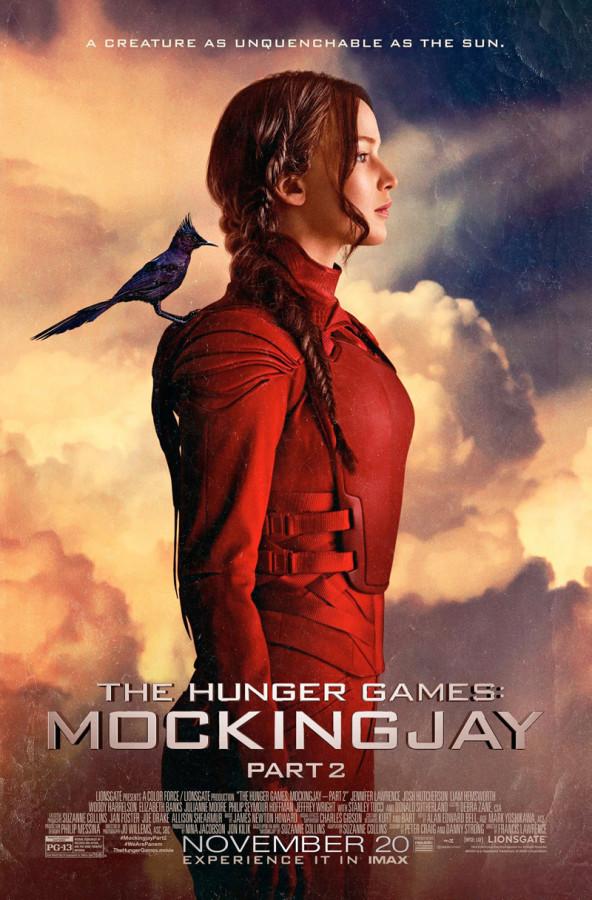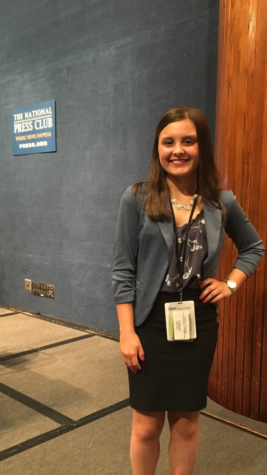Mockingjay Part Two Movie Review (WARNING: SPOILERS)
December 6, 2015
Mockingjay Part Two is the fourth and final film in the Hunger Games franchise. For those of you who have refused to read the incredible best-selling novels or have ignored the film’s trailer playing in endless lurid loops on every screen, the movie takes place in a distopian futuristic society in which the Capital exploits its surrounding districts. In the past films and novels, each district was forced to send two tributes (a boy and a girl) to fight in a battle to the death in a deadly arena against the tributes of other districts. Only one victor could be crowned, until Katniss Everdeen (Jennifer Lawrence) and Peeta Mellark (Josh Hutcherson) defied the rules in the 74th Hunger Games which initiated a revolution.
In a movie franchise that attempted to imitate Harry Potter in its division of the last novel of the series into two movies (other culprits include Twilight and Divergent), film makers everywhere will hopefully come to the conclusion that the incentive of money-making is not an entirely great idea. Splitting the final novel, Mockingjay, into two films was not as successful creatively as it was monetarily. The split resulted in Part One focusing on mostly political policies of the districts and the Capital, respectively. Part Two, as a result, mainly portrays the actual war that takes place between the two opposing forces, and therefore (in my opinion) is the superior of the two.
As an avid reader of the novels, I must admit that after the first film, the saga slowly started to redeem itself. The cinematography became of significantly higher quality, the soundtrack turned into something surprisingly moving, and the director (Francis Lawrence) payed increasing attention to the original story of the novel and the parts of the books that us bibliophiles are obsessed with. This therefore increased the popularity of the saga among the public.
Now, it is here that I beg of you not to read anymore if you have not seen the movie or read the novel. Do not ruin it for yourself.
As an activist for picking up the book before picking up the television remote, it may come as no surprise to you that this review is rather harsh for fans. However, my love of these books runs awfully deep and I cannot stand anything less from the film makers than absolute perfection. Therefore, one may assume that this film was not incredibly satisfying. My favorite moment in the trilogy, and arguably the most important one (SPOILER)–Prim’s death–was not done correctly. The whole premise of the trilogy-turned-quadrilogy was that Katniss volunteered for her sister in the first Games to save her life and she went through so much pain and suffering just so Prim could die in the end anyway. This moment that caused millions of fans around the world to cry when the Mockingjay novel first came out, caused a simultaneous moment of confusion and anger in the eyes of viewers in theaters everywhere. Such an important death happened so quickly that those in the audience who had not read the books shook their heads in uncertainty. The filmmakers could have utilized the soundtrack as a way to generate powerful emotions in audiences that novels lack the ability to do, but the entire scene was filled with nothing but the void of silence.
Despite this major flaw, Mockingjay Part Two was actually my favorite film in the saga. This film was the most emotional of the four and the most action-packed, although being one of the first in the Hunger Games series in which there is actually no Hunger Games. The scene that stuck to the book the most and unfolded on the screen exactly as how I had pictured it on the pages when I first read it in 2010, was the final scene before the screen turns to black (otherwise known in the book as the Epilogue). It is in this scene that Katniss, broken and yet trying to find a sense of peace, tells her daughter, who she holds in her arms, that one day she will tell her how she got her nightmares. She says how she plays a game in which she tries to recall every nice deed that someone has done for her and remarks how the game does get tedious after a while, but “there are much worse games to play.” Suzanne Collins ended the trilogy with these same simple but beautiful words and, as a devoted fan, I am so glad that Francis Lawrence decided to leave this aspect of the novel unchanged. In these words, Katniss realizes that she will never escape the horror and memories of the Hunger Games and everything that has happened, but she hopes to create a world for a new generation in which those memories truly stay mere memories. She demonstrates the theme of war and peace as well as darkness with light which makes the ending to the film and novel both memorable and inspiring.



